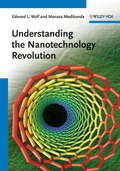Understanding the Nanotechnology Revolution

1. Auflage April 2012
X, 204 Seiten, Softcover
45 Abbildungen
Sachbuch
Kurzbeschreibung
Einzigartiger Überblick über das Fachgebiet der Nanotechnologie für interessierte Laien. Seine eher allgemeine Ausrichtung macht dieses prägnante Sachbuch überaus interessant. Den Autoren gelingt es, die Schlüsselkonzepte verständlich und nahezu ohne Mathematik zu vermitteln.
Jetzt kaufen
Preis: 30,90 €
Preis inkl. MwSt, zzgl. Versand
Euro-Preise für Wiley-VCH- und Ernst & Sohn-Titel sind nur für Deutschland gültig. In EU-Ländern gilt die lokale Mehrwertsteuer. Portokosten werden berechnet.
- Gedruckte Ausgabe vergriffen -
A unique introduction for general readers to the underlying concepts of nanotechnology, covering a wide spectrum ranging from biology to quantum computing.
The material is presented in the simplest possible way, including a few mathematical equations, but not mathematical derivations. It also outlines as simply as possible the major contributions to modern technology of physics-based nanophysical devices, such as the atomic clock, global positioning systems, and magnetic resonance imaging. As a result, readers are able to establish a connection between nanotechnology and day-to-day applications, as well as with advances in information technology based on fast computers, the internet, dense data storage, Google searches, and new concepts for renewable energy harvesting.
Also of interest to professionals working in law, finance, or teaching who wish to understand nanotechnology in a broad context, and as general reading for electrical, chemical and computer engineers, materials scientists, applied physicists and mathematicians, as well as for students of these disciplines.
Ch. 2 Smaller is More, Usually Better, and Sometimes Entirely New
Ch. 3 Systematics of Scaling Things Down
Ch. 4 Biology as Successful Nanotechnology
Ch. 5 The End of Scaling: the Lumpiness of All Matter
Ch. 6 Quantum Consequences for the Macroworld
Ch. 7 Some Natural and Industrial Self-assembled Nanostructures
Ch. 8 Injection Lasers and Billion-Transistor Chips
Ch. 9 The Scanning Tunneling Microscope Revolution
Ch. 10 Magnetic Resonance Imaging MRI: Nanophysics of Spin 1/2
Ch. 11 Nanophysics and Nanotechnology of High Density Data Storage
Ch. 12 Single Electron Transistors and Molecular Electronics
Ch. 13 Quantum Computers and Superconducting Computers
Ch. 14 Looking into the Future
Professor Wolf has conducted research in solid state physics, scanning tunneling microscopy, electron tunneling spectroscopy and superconductivity, and published over 100 refereed publications. He is Fellow of American Physical Society, and has served as Academic Department Head and Program Director at National Science Foundation.
Manasa Medikonda holds an awarded Bachelor of Engineering in Electronics and Communication Engineering from the Institute of Technology at Bangalore, India; and a Master of Science in Electrical Engineering at Polytechnic Institute of New York University. She has worked as a Software Engineer with Infosys Technologies in India, and presently holds a position at the Polytechnic Institute of New York University, where she has worked with Edward Wolf on his books and an audio lecture course which serves as the basis for this book. Manasa has been very engaged in bringing science into public. She has participated in Science Clubs, assisted teachers in organizing fairs, and tutored high school students in maths, science and languages.


